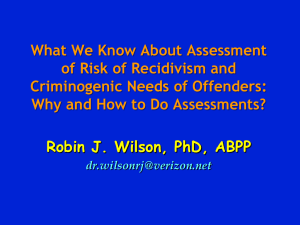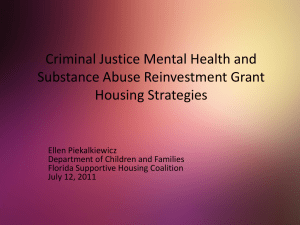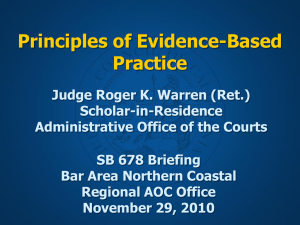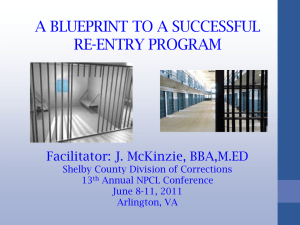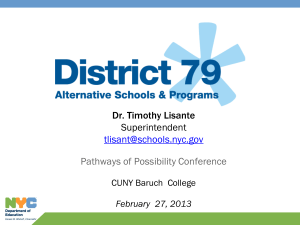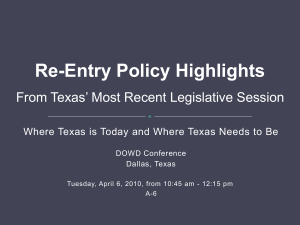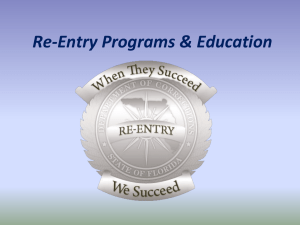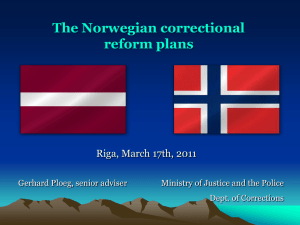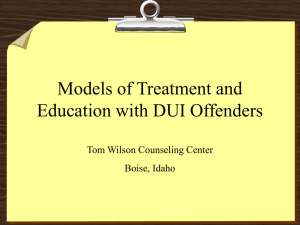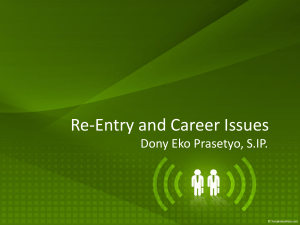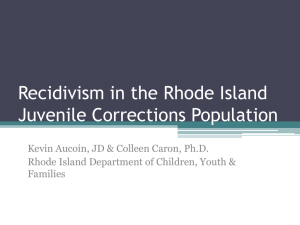CREW Presentation - Colusa, Glenn, and Trinity Community Action
advertisement
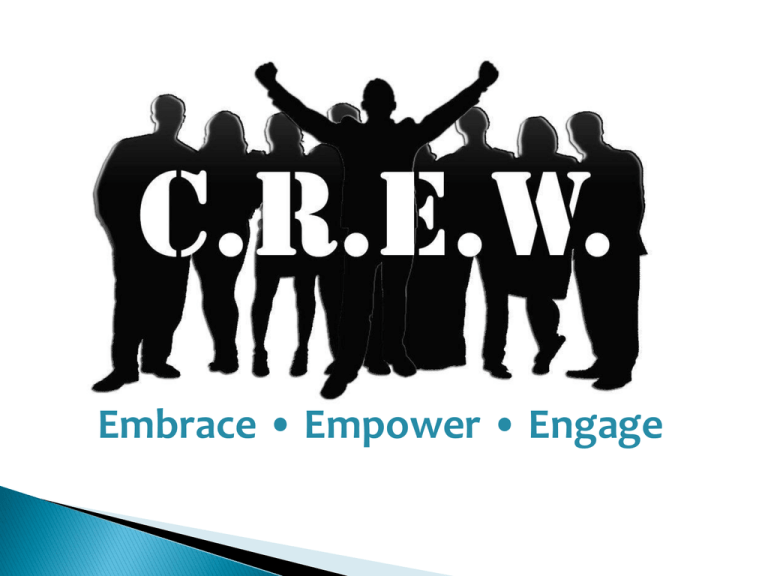
Embrace • Empower • Engage Maximizing partnerships and resources to embrace, empower and engage re-entry individuals to reduce recidivism. Embrace • Empower • Engage Glenn County Health and Human Service Agency asked three simple questions: ◦ Who is the population with a need? ◦ What do we want to achieve? ◦ How do we make it happen? …….From there…….. We came up with C.R.E.W. Community Re-Entry Work Program California’s rate of recidivism is 65% (highest in the US) October 1st , 2011. AB 109 mandated a shift of responsibility for non-violent, non-sexual, and non-serious offenders from the state to county probation departments. Persons released from prisons, local jails or institutions have little or no means of becoming self-sufficient or a support system for medical or behavioral health issues. C.R.E.W. Embrace • Empower • Engage Target populations, individuals released from the following institutions: • Jail/prison •Hospitals •Shelter or a Foster Care Facility. The program gave individuals the choice between: •Receiving General Assistance for 3 months which is a loan • Or enroll in the C.R.E.W. Program. Realignment of low level offenders from the state to the counties. Two populations realigned: ◦ Mandatory Supervision ◦ Post Release Community Supervision Community Corrections Partnership ◦ Reduction of recidivism and alternatives to incarceration ◦ CCP Plan and Annual Budget ◦ Established a case plan as a priority (AB-109 Task Group) Use program limitations to drive innovation Agencies Faith and Community Based Partners Funders and Sponsors Employment and Volunteers Re-entry Population General Community Local Businesses Families Educational Institutions C.R.E.W. - AB-109 Work Force Group Probation •Glenn County Sheriff Department/ Jail •Court System • District Attorney • Social Services • Glenn County office of Education Department • Child Support Services •Mental Health/Drug and Alcohol • Community based partners • Employment/Business Services •Community Action Partnership (Meet bi-weekly) Staff cases; discuss the re-entry plans assigned for each individual. 90 Day Re-Entry Plan Needs Assessment Individual Development Plan Identify Barriers SET UP PRIORITIES AND ESTABLISH GOALS AND ACTION PLAN Low Risk Individual Probation Information about Resources Supervision Only Moderate Risk Probation High Risk Probation Discuss Individual Development Plan Discuss Mandated Services and Individual Development Plan. Eligibility Screening Eligibility Screening Information About Resources Option To Enroll In C.R.E.W Program Enroll in C.R.E.W program Housing & Community Services Intake and Identify individuals needs (Establish Goals & Outcomes) S.T.E.P – Two Week Class Services Toward Empowering People Individual Development Plan Embrace • Empower • Engage Employment Services (Work Project / CREW Leaders) Re-assessments Probation, Mental Health, GCOE With CREW Lower rates of recidivism Without CREW No change (or increase) in recidivism rates (highest in nation) Lower utilization of county $$$ and Increased county jail population services Increased employability = more $$$ in the local economy Increased crime & substance abuse Job and life skills coaching No community support on re-entry Proactive approach to a situation affecting all counties Crossing fingers and hoping for the best Identifying partners and stakeholders in the community “Someone else’s problem” Savings On Impacted County Services (Small rural county estimation) County Function Estimated Costs Judge – Annual Salary $120,000 @ 60.00/hr X 10 = $600 DA – Annual Salary $90,000 @ 45.00/hr X 10 = $450 Law Enforcement $50,000 @ 25.00/hr X 10 = $250 Court Clerk – Annual Salary $40,000 @ 20/hr X 10 = $200 Total Cost of General Funded positions ER Visit (single visit) – Medical need $ 1,500 in salaries at minimum $1,500 X 10 = $15,000 Budget (10 participants) ◦ FESG: $12,500 ◦ Case Management: $9,500 ◦ Community-based Partner: $1,000 Costs of returning to court ◦ Estimated costs of one hour in court and one ER visit (all 10 participants): ~$16,500 ◦ Estimated costs of re-incarceration (all 10 participants): ~$328,500 ◦ Emergency Shelter Costs: $50/person /night ($1,500/month each) Savings ◦ General Assistance savings so far: $7,722 ◦ Potential savings created by CREW: $396,222 (Of general funds based off 10 individuals) C.R.E.W Outcomes 1. Improving on state recidivism rate 2. Achieving gainful employment 3. Saving county money by not having to utilize cash aid Eight of ten participants completed program in first year businesses Five are employed; two of those five are starting or running their own Only one re-offender Only one participant received cash aid 12 active cases; 22 more in pre-release phase Five have completed STEP class (two in the process (58.3%) Two have obtained full-time employment (16.6%) Four have obtained part-time employment (33.3%) All twelve have housing and food access (100%) Nine have achieved family reunification/support (75%) Differences between indigent health and Medi-Cal ◦ CMSP and Path2Health have stricter eligibility House arrest/alternative incarceration ineligible for indigent care Drug Medi-Cal Reform (DMC) ◦ Potential resource for AB109 needs and preventive services ◦ Realigned to counties May affect revenue meant for other realigned programs. Major reforms needed in order to achieve local usefulness of DMC and to realize the potential for new revenue from DMC. Health Care Reform ◦ Medicaid expansion: 100% federal reimbursement, down to 90% (nearly double current rate) ◦ Greater reimbursement rates for mental health/substance abuse treatment ◦ Opportunity to improve services for public and AB109 population Social Services and Behavioral Health as an alternative to incarceration: ◦ Wraparound alternative an effective approach ◦ New ways of doing business help communities and partners address re-entry issues and engage in preventive services C.R.E.W Families Community Agency Reduce Recidivism Embrace Empower Engage Maximizing partnerships and resources to embrace, empower, and engage re-entry individuals to reduce recidivism. Al Scott Community Action Partnership (530-934-1572) ascott@hra.co.glenn.ca.us www.cgtcap.org Luz Melgarejo Community Action Partnership (530-934-1452) lmelgarejo@hra.co.glenn.ca.us www.cgtcap.org Pedro Bobadilla Community Action Partnership (530-934-1588) pbobadilla@hra.co.glenn.ca.us www.cgtcap.org Lucy Hernandez Community Action Partnership (530-934-1452) lhernandez@hra.co.glenn.ca.us www.cgtcap.org
